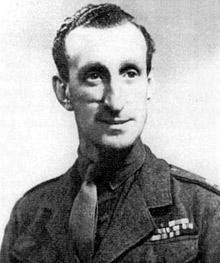Richard Geoffrey Pine-Coffin
| Richard Geoffrey Pine-Coffin | |
|---|---|

Colonel Richard Geoffrey Pine-Coffin.
|
|
| Nickname(s) | 'Wooden Box' |
| Born |
December 2, 1908 Devonshire |
| Died | February 28, 1974 (aged 65) Royal Naval Hospital Haslar |
| Allegiance |
|
| Service/branch |
|
| Years of service | 1928–1958 |
| Rank | Colonel |
| Commands held |
3rd Parachute Battalion 1st Parachute Brigade 6th Airborne Division 7th (Light Infantry) Parachute Battalion 5th Parachute Brigade 6th Airborne Division |
| Battles/wars | Malayan Emergency |
| Awards |
Distinguished Service Order & Bar Military Cross |
| Relations | Peter Pine-Coffin (son) |
| Other work | Regimental colonel and commander of Depot The Parachute Regiment and Airborne Forces |
Colonel Richard Geoffrey Pine-Coffin DSO & Bar, MC (2 December 1908 – 28 February 1974) was an officer of the British Army who saw service during World War II. He commanded the 3rd Parachute Battalion in North Africa and the 7th (Light Infantry) Parachute Battalion in Normandy, Belgium, and Germany. His troops, amused by the unusual applicability of his family name (soldiers were usually buried in simple pine wood coffins), referred to him as "Wooden Box".
Born to John Edward Pine-Coffin and Louise Pine-Coffin at Portledge, the Pine-Coffin family estate in Devon, he was one of six siblings, of which a brother named John was the youngest. He was educated at Eton and Trinity College, Cambridge. His family had a long tradition of serving in the British armed forces; his father, a brevet major in the British Army, served with the mounted infantry in the Second Boer War (gaining the Distinguished Service Order) and died in 1919, whilst his uncle, Lieutenant Tristram James Pine-Coffin served in World War I and died in northwestern Russia in 1919.
...
Wikipedia
